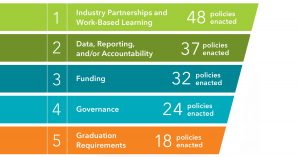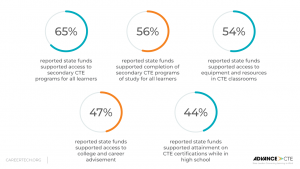Capitol Hill remained quiet this week as lawmakers continue to campaign in home states and districts ahead of elections scheduled for next week. Elsewhere, a key deadline for feedback on a regulatory proposal impacting the Carl D. Perkins Career and Technical Education Act (Perkins V) approaches later this month. In addition, a Department of Education Challenge, Department of Labor Ambassadors, and a toolkit for AI integration in education technology.
Elections to Determine 2025 Agenda
 Next week’s general elections set to take place across the country will determine control of the White House and the balance of power between the parties in the 119th Congress. The election results will also likely define the remainder of Congress’ agenda in the coming weeks ahead as the 118th Congress begins to wind down. Election results in several key races are widely expected to potentially take additional time beyond Election Day to sort out. Nonetheless, lawmakers are scheduled to return to Capitol Hill the week of November 12. When Congress returns for this lame-duck session, lawmakers are likely to consider legislation to move forward with or further postponing federal fiscal year 2025 (FY25) funding for the federal government, including investments like those made by Perkins V. As these and other efforts get underway, Advance CTE will continue to advocate for policies in support of high-quality Career Technical Education (CTE) and strengthened investments in CTE.
Next week’s general elections set to take place across the country will determine control of the White House and the balance of power between the parties in the 119th Congress. The election results will also likely define the remainder of Congress’ agenda in the coming weeks ahead as the 118th Congress begins to wind down. Election results in several key races are widely expected to potentially take additional time beyond Election Day to sort out. Nonetheless, lawmakers are scheduled to return to Capitol Hill the week of November 12. When Congress returns for this lame-duck session, lawmakers are likely to consider legislation to move forward with or further postponing federal fiscal year 2025 (FY25) funding for the federal government, including investments like those made by Perkins V. As these and other efforts get underway, Advance CTE will continue to advocate for policies in support of high-quality Career Technical Education (CTE) and strengthened investments in CTE.
State Plan ICR Comment Deadline Approaching
As Advance CTE shared previously, the U.S. Department of Education has recently published a regulatory proposal with significant implications for the implementation of Perkins V. The Information Collection Request (ICR) would, if advanced, amend Perkins V’s State Plan Guide and Consolidated Annual Report (CAR) requirements. Advance CTE and partners have continued to express significant concern regarding this proposal and plan to provide formal feedback to the proposed State Plan Guide regulation by the deadline of November 12. As a reminder, feedback related to proposed changes for Perkins V’s CAR is now due November 26, 2024. We encourage states and other impacted stakeholders to submit comments in response to these proposals ahead of these deadlines.
Department of Education’s “Power Your Future” CTE Challenge
Earlier this fall, the ED launched the CTE Momentum “Power Your Future” Challenge to engage with high school learners considering careers in the clean energy sector. Interested applicants must submit “innovative action plans” that connect with a wide range of stakeholders and outline the use of clean energy in their schools and communities by November 19, 2024. A webinar providing additional information about the challenge is available online. Read more about the effort here.
Department of Labor Welcomes Apprenticeship Ambassadors
Last week, the White House welcomed the latest cohort of Apprenticeship Ambassadors and celebrated the current participants for working to further diversify and improve apprenticeship opportunities across the country. Since its inception in 2022, the ambassador initiative has welcomed more than 440 members representing organizations in emerging and high-growth industries that support apprenticeship programs in local communities and contribute to national initiatives like the upcoming National Apprenticeship Week. Read more about the celebration here.
Office of Educational Technology Publishes Toolkit on AI Integration
The U.S. Department of Education’s Office of Educational Technology (OET) published a toolkit last week titled Empowering Education Leaders: A Toolkit for Safe, Equitable, and Ethical AI Integration. The toolkit was developed in response to the Biden-administration’s Executive Order on the Safe, Secure, and Trustworthy Development and Use of Artificial Intelligence from last year, which charged the Secretary of Education, along with other Administration officials, to create guidance for education leaders and their learning communities on the potential impact of artificial intelligence in the classroom and how best to make use of this emerging technology. It was developed with input from educators, technology leaders, and other stakeholders to address AI’s dynamic challenges in federal policy and educational issues, like privacy, civil rights, and digital equity. Access the full toolkit here.
Rob Young, Communications & Advocacy Associate
Steve Voytek, Policy Advisor


 As we look to the future of Career Technical Education (CTE), Advance CTE continues to support high-quality CTE programs created through legislation that addresses key challenges and opens new opportunities for learners and educators alike. In this blog, Policy Associate Velie Sando highlights recent state policies that can play a crucial role in shaping a more dynamic, accessible, and industry-aligned landscape.
As we look to the future of Career Technical Education (CTE), Advance CTE continues to support high-quality CTE programs created through legislation that addresses key challenges and opens new opportunities for learners and educators alike. In this blog, Policy Associate Velie Sando highlights recent state policies that can play a crucial role in shaping a more dynamic, accessible, and industry-aligned landscape. To access our state policy tracker and explore other innovative CTE-connected policies, visit Advance CTE’s
To access our state policy tracker and explore other innovative CTE-connected policies, visit Advance CTE’s  This week both the House and Senate were in session ahead of a new funding deadline and the President’s annual State of the Union address to a joint session of Congress last night. The President’s address to Congress featured a range of topics, including how recent federal bipartisan legislation focused on infrastructure and the nation’s advanced manufacturing capacity have helped to spur greater demand for skilled workers. Notably, the President highlighted the importance of Career Technical Education (CTE) noting that his administration is working to connect “…businesses and high schools so students get hands-on experience and a path to a good-paying job whether or not they go to college.”
This week both the House and Senate were in session ahead of a new funding deadline and the President’s annual State of the Union address to a joint session of Congress last night. The President’s address to Congress featured a range of topics, including how recent federal bipartisan legislation focused on infrastructure and the nation’s advanced manufacturing capacity have helped to spur greater demand for skilled workers. Notably, the President highlighted the importance of Career Technical Education (CTE) noting that his administration is working to connect “…businesses and high schools so students get hands-on experience and a path to a good-paying job whether or not they go to college.” 




 Tell me more about your journey to the Fellowship.
Tell me more about your journey to the Fellowship. Tell me more about your journey to the Fellowship.
Tell me more about your journey to the Fellowship. 